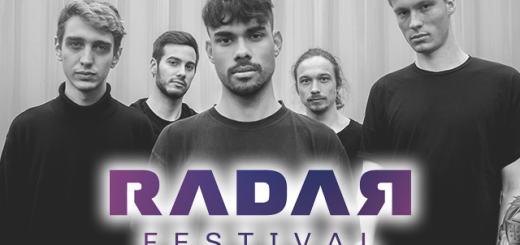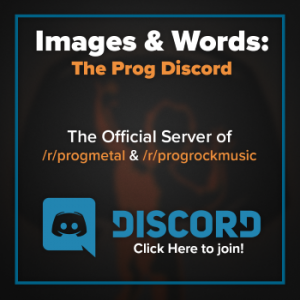Behind the Scene: Chris Parkins – London Prog Gigs Promoter Interview
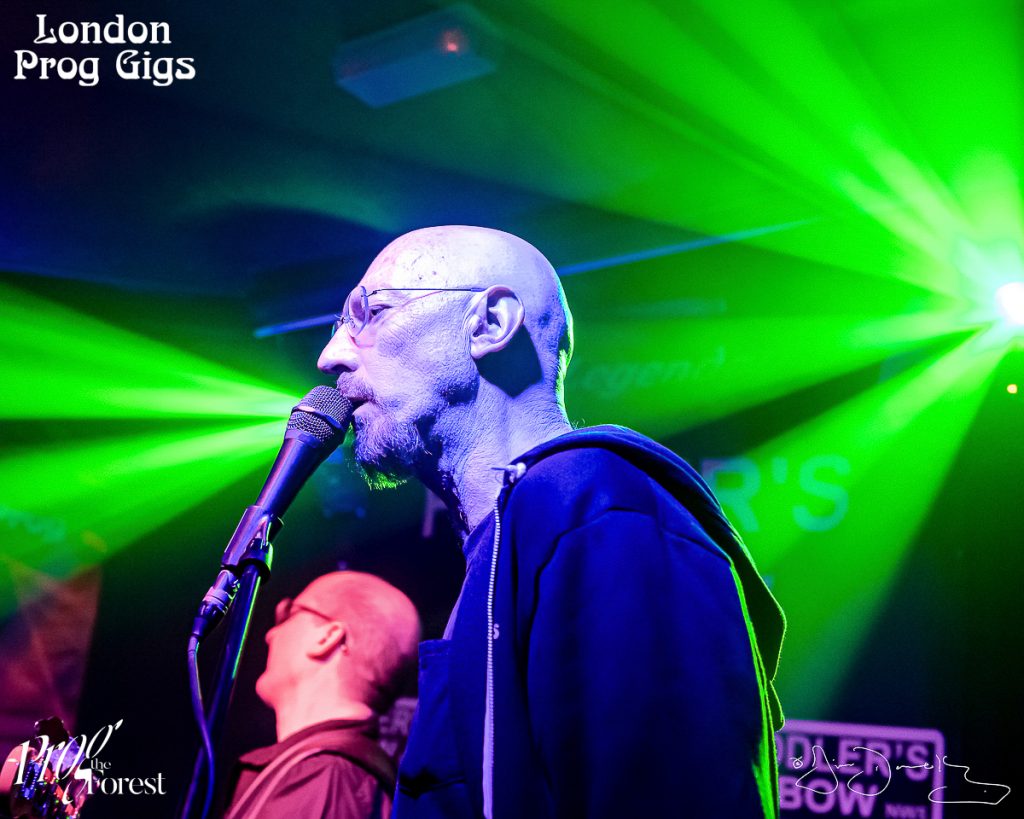
Photo from: Jim Donnelly
Editors Note…
I had the idea a long time ago to interview and talk to people behind the scenes of prog as we know it. There are a lot of characters that keep things moving that aren’t just the artists, and this is perhaps a good place to shout about these people and showcase their hard work. Artist managers, tour managers, festival organisers, photographers, journalists, and more.
I conducted this particular interview with Chris Parkins at the start of this year, and had the original idea to stack up a handful of interviews with other characters, managers, photographers, luthiers, and more – but alas time got to me and I never got very far. Perhaps I will in the future.
For the time being though, here is some insight to what Chris does for our progressive rock scene local to London, UK – one that I’m very familiar with thanks to his relentless promoting of bands and artists I’ve never heard of through his London Prog Gigs Facebook group and brand (facebook.com/groups/LondonProgGigs/).
So Chris, what’s the process of “putting on” a show?
I’ve never considered myself a promoter, mostly i’m a gig facilitator, I like to help people who might not have the connections to know what to do. If you want to play a gig in London you can apply to venues – but venues have got 100 emails a day, and you may not even get a reply, but venues will typically reply to people that they know already in one way or another. There’s half dozen venues i use that if I send an email they’ll always reply to me.
A band will say “I’d like to play a gig in London”, and my job is if I think that they’re gonna sell any tickets – because I’ve got to make sure that the venues are happy with gig that they put on. What some people don’t understand or know are that the economics of running a gig. We’re not in theatre and we don’t get arts council funding, the money that there is the money that people pay for tickets and food and drinks sales. There’s a bit more when fans are nice enough to buy merch from the band.
Generally a gig i’ll do I’ll hire a venue outright. They’ll provide a sound guy, a PA system and lights, so then the band can turn up with their instruments and equipment. We have to trust that the ticket sales will be sufficient to cover the hire cost of the venue, and the venue want to make sure that enough people are there that enough people buy drink and food, the combination of the two in theory makes everybody happy.
If you put a gig on and 10 people turn up and you’ve paid for the venue, it’s not sufficient for the venue to make enough money back. You’ve got to choose the venue for the amount of capacity you’re expecting people to get -sometimes people get it wrong
If you sell out 70 tickets at the Hope and Anchor (80 person capacity) it’s great, but if you sell 70 tickets at The Dome (600 person capacity) it would have been a fail. When it works out it works out really well and everybody’s happy.
What else do you have to do?
I do the behind the scenes sorting out between the bands and the venue and just getting everything organised, sorting out posters. I find that ‘prog’ tends to live on Facebook, which let’s face it is horrible, but without Facebook we wouldn’t really have a prog scene.
There are still people who liked the bands that I liked in my youth
Perhaps a band comes with a full roster for the evening, maybe its a band that is looking for another artist to team up with, so you’ve got to match acts together. You have to decide, do we have 2 or 3 bands? How complicated are the changeovers going to be? Have they got loads of bloody keyboards? Have we got enough time to do the soundcheck?
Usually you are if you are at the mercy of the venues sound engineer you are usually fine – sometimes you get sound engineers who are jaded or frankly deaf. That can always be a struggle.
And then finally, is there any money left over? I’ve got to sell tickets, deciding what ticket price, sometimes it depends on the band. I often hear “If there’s any money at the end then that’s great, but what we really want to do is play”. So, I coordinate the money, pay expenses, pay the bands the venues, there’s little intricacies with various ticket sites, and that’s the gig done.
I love enabling people to play, it’s nice. This band put on a gig, and these people went to go and see it. It was a great evening, and that wouldn’t have happened if I hadn’t have organised it – and that’s a nice feeling, That’s where i get a kick out of it.
What I want to do is help people out that can’t do it themselves, I don’t want to be employed, I’m paying back something to the music scene, and that’s what I enjoy.
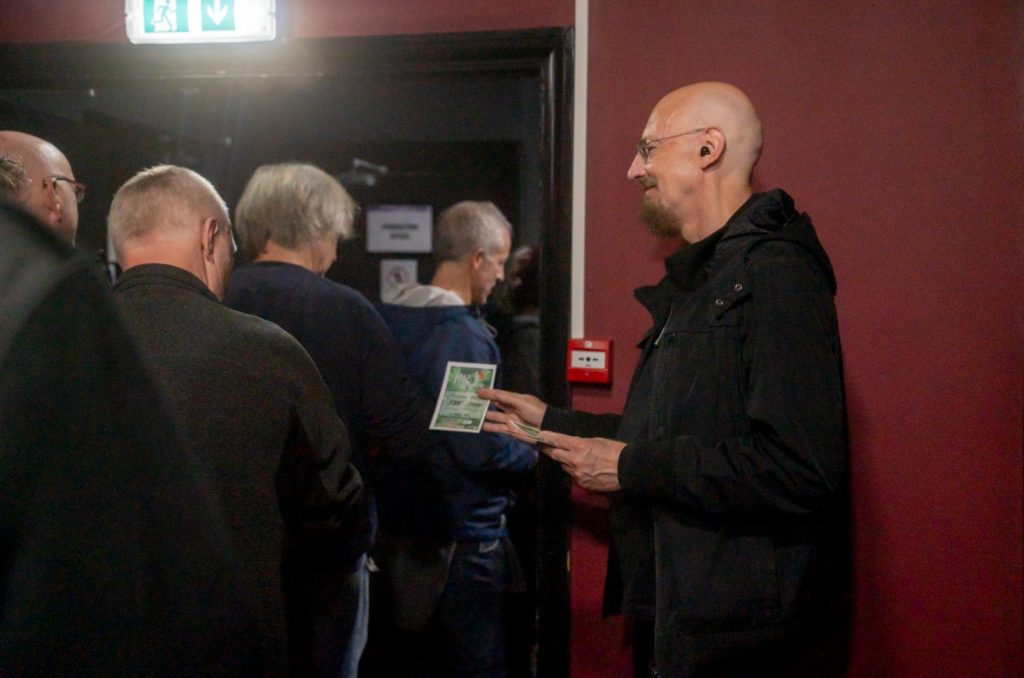
Chris Parkins handing out fliers at a Von Hertzen Brothers show to promote upcoming London Prog Gigs events
How did you first get into gig promotion?
My background when I was ents manager at uni. It was a paid job, and you didn’t get to speak to the bands because you’re just a worker. I don’t want to be just a worker i want to help so that’s what I do, and that’s why now I prefer dealing with people who are happy to be playing
What was the first prog gig you put on?
Hats off Gentleman, It’s Adequate. I got to know Malcolm and Mark very well very quickly.
Why did you come back to being a promoter?
I’d taken a number of years out of the music scene to have a career and kids, but when I was in a railway station in Manchester, I was in WH Smiths, saw a copy of a magazine called ‘Prog’, and thought “good lord a magazine about prog music!”, so I swiftly bought it and discovered there was a prog scene – I had no idea it still existed.
I’m always very grateful for Jerry Ewing [Prog Magazine Editor], without him prog wouldn’t exist in the way it would today
Inside there was all this stuff about bands I’d never heard of which opened my eyes to the modern current prog scene, and all the prog adjacent, post metal, post rock, all of these genres i wasn’t really familiar with, which in my opinion are all in under the general progressive music umbrella.
I then saw the advert for Cruise to the Edge 2014 – so I went and that reinvigorated my interest in the music. After coming back home, I started a group for people who go to prog gigs in London, just a meetup to talk about prog, a group for people that I knew who would go and see gigs.
That took off very quickly, I was surprised at how many people were interested in it. Malcolm from Hats off Gentleman, It’s Adequate got in contact so I went to see them at the Dublin Castle, and he said to me he’d like put on a charity gig that they could play at with other people – so we came up with Prog the Forest, and that was what got me back into it. More artists got in contact with me asking me to put on gigs, and it just escalated from there.
Fiddlers Elbow is a venue we use for Prog the Forest. It’s a nice small venue in Camden, London – and they also put on their own venue promoted nights. It’s possible to apply to them and ask if they’ll put you on as a band, and if you’re lucky they’ll say yes.
“I don’t like turning people down, but I’m putting on a lot of gigs now”
Anyone can put on a show, but it’s the time involved that makes it a challenge. If you have a day job it’s hard enough to find the hours in the day to start from scratch contacting and emailing people.
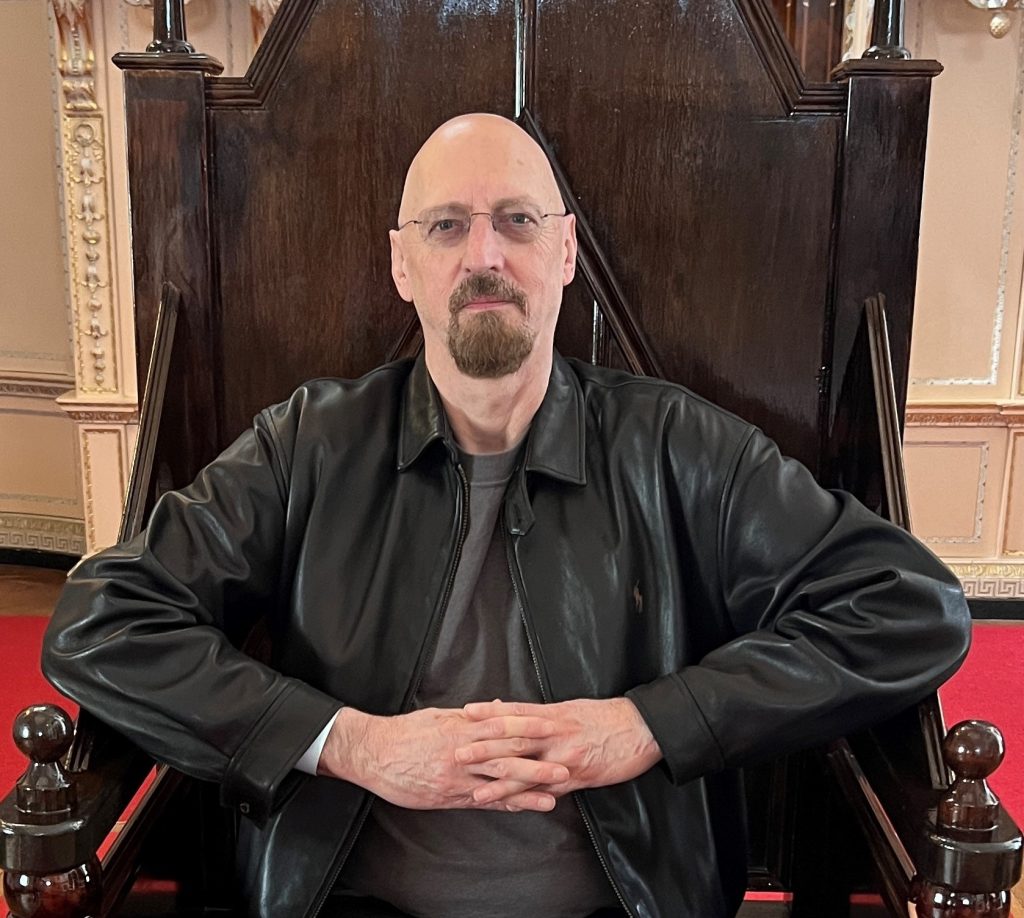
Where are the challenges now?
In the old days musicians could be musicians because there was money in it and other people did the promotions, but these days unless you the band tell people that you’re doing a big show – you’re not going to get people to go. You can’t rely on people turning up, and you can’t rely on the promoter magically finding an audience for you – it just isn’t going to happen.
A lot of people feel somebody is being ripped off, and there’s a kickback of venues expected bands to play for nothing, and there’s a feeling that all musicians should be paid, but it’s not realistic unless you have a good sized audience.
If you think venues have got loads of money and are deliberately ripping off musicians by not paying them, they aren’t – venues are going bust they haven’t got money either, everyone is struggling, they’ve got business rates, staff, bills, people to pay, and you don’t want anyone to take advantage of anybody. Sometimes there aren’t just enough people interested in live music to pay for it all and that isn’t a new thing.
Venues can sometimes have gatekeepers, if you’re a venue you are swamped by people wanted to pay at your venue so you end up having to choose. It’s frustrating when you don’t “like my genre”, there can be a snootiness about some of the posher venues that I don’t appreciate, if you aren’t trendy enough or arty enough… but there is room for everybody!
Another issue is most people lose interest in music in their mid 20s i suppose, if you want to see a band, people tend to want to see something they know, if you’re in your 40s, they’ll see something they knew 20 years ago so they’ll see a tribute band.
What challenges are specific to London?
There’s a phenomenal amount of live music in London, and most people don’t know much about, or care that the live music scene exists. They’ll have heard of Glastonbury, and perhaps go to the larger venues to see legacy acts like the O2 Arena, or Wembley. There’s probably 15 concerts alone you can go and see every night – and there’s so much other stuff from theatre shows to comedy nights to cabarets. If you tried to run a list of everything that’s going on it’d need an entire magazine. How does anyone decide what to go to in such a large city?
If I ever say a gig has broken even – that’s just for the gig, that doesn’t include costs for the band, hotels, travel, etc. If you are a band and you aren’t selling over 200 tickets doing a show in London, it’s financially painful.
The idea of seeing a band in a venue under 200 people is unknown, it’s like it doesn’t exist in mainstream media. It’s invisible to anyone that isn’t interested in it, it’s a minor scene that we’re in, and we’re struggling to find enough people. Pretty much every concert i put on, if i could sell another 20-30 tickets it would make a huge difference to the money that the musicians get.
What is different about prog?
Prog people tend to buy music. I frequently hear “No don’t use Spotify, I only ever buy the CDs!”, but these guys don’t necessarily always go to see a band, so we’re chasing an audience that likes modern music, they want to see music that’s original that isn’t pop, so it’s a small audience.
Thanks very much to Chris Parkins for his insight, and his devotion to the bizarre music scene that we all know and love – prog.


